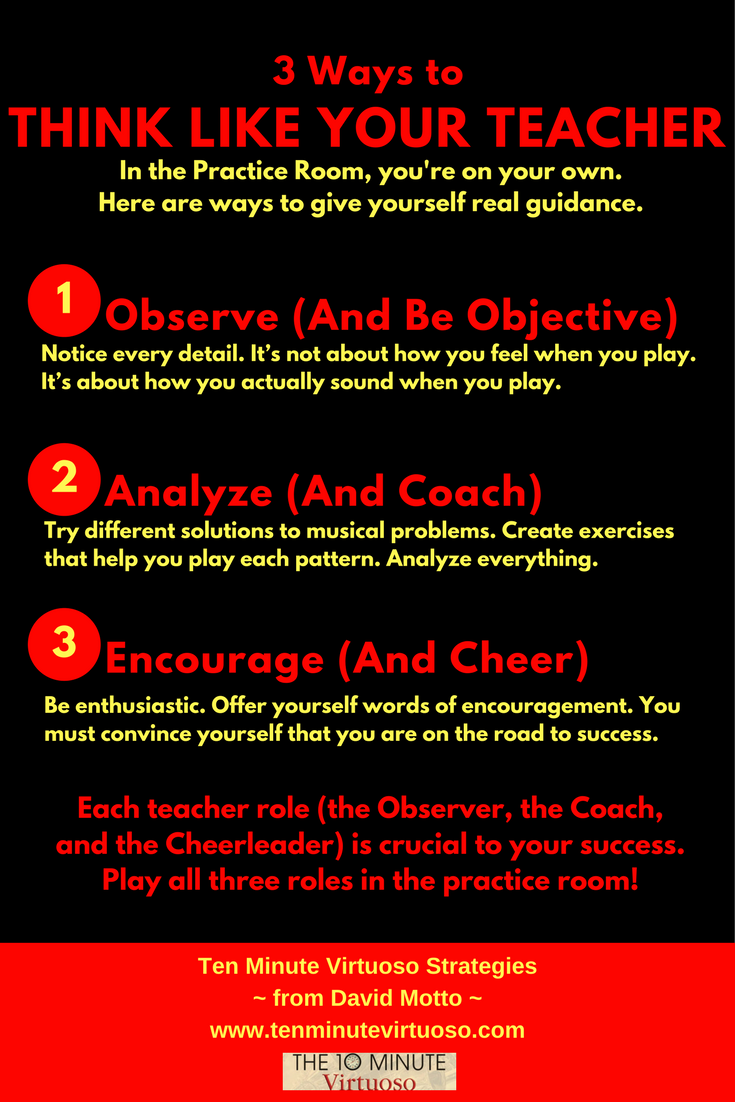David Motto’s Practice Tip of the Week:
Think Like Your Teacher
You’re Alone When You Practice
Imagine how great it would be to have your music teacher with you every time you practice – like a sports coach working with athletes. You’d get objective feedback. You’d get encouragement. And, you’d stay focused on your task.
But, that’s not the way it works for musicians! You’re left on your own for six days between lessons and are totally alone when you practice. Your only choice is to be your own teacher in the practice room.
Benefits of Playing the Teacher Role
Being your own teacher is not about replacing your teacher. It is about taking on the teacher persona during your practice sessions.
Playing this role means you must think like your teacher. Today, I’m giving you 3 ways to think like your teacher in the practice room. Each of these strategies will help you make big strides forward in learning, improving, and retaining skills.
In addition to helping with your music skills, acting like your teacher when you practice lets you step outside your usual thought process – so you’re not trapped by your usual assumptions, emotions, and reactions to your playing.
Let’s take a look at how you can think like your teacher to maximize the impact of your practicing:
Think Like Your Teacher – 3 Strategies
1. Observe (And Be Objective)
In the practice room, you need objective feedback. If all your decisions are based on how you feel when you play, then you’re only giving yourself subjective feedback – which is clouded by your emotions and mood.
What would a teacher do? They would observe your actions closely and listen to your sound carefully. They would pay attention to the actual music you create and how efficient your technique is to make that music.
You need to do the same. Notice every detail of your technique, sound production, rhythm, and intonation. If you’re struggling with being objective, shoot video of yourself practicing. Then, watch the video.
It’s not about how you feel when you play. It’s about how you actually sound when you play.
2. Analyze (And Coach)
Your music teacher is your personal coach. Once they’ve observed you, they start giving you advice. They’ll give you solutions to technical issues. They’ll create exercises that help you play a certain pattern. And, they’ll offer musical suggestions on things like phrasing, dynamics, and how to attack your notes.
Essentially, a good teacher analyzes everything you’re doing and coaches you through a series of potential solutions that create improvements for you. All of this analysis is designed to improve your technique and your sound.
In the practice room, you’ve got to be your own analyst. Try different solutions to the musical problems you’re facing. Be creative and don’t be afraid to try things that are different than how you usually play. That’s the whole point – to change your playing. By definition, you’ll have to try new ideas to create change.
3. Encourage (Support and Cheer)
In addition to being an eagle-eyed observer and personal coach, another role of great music teachers is to be your support team and Encourager-in-Chief. I think of great teachers as cheerleaders – always enthusiastic that you can and will win, no matter how hopeless you may feel after trying to play a particularly challenging set of notes.
This cheerleader role is essential for your success in the practice room. You’ve got to inspire yourself and offer yourself words of encouragement. You must convince yourself that you are on the road to success.
All Three Roles are Important
Music teachers have many responsibilities. When you’re at your lesson, your teacher is constantly mixing and matching these responsibilities based on what you’re doing at any given moment. It’s a constant juggling act of observing, analyzing, offering suggestions, giving encouragement, being nice (but not too nice), being firm (but not too firm), and creating solutions personalized to your needs.
Each of the teacher’s roles (the Observer, the Coach, and the Cheerleader) is crucial to the success of your lessons. And, the roles are equally crucial during your practice sessions.
There’s just one small problem: Your teacher isn’t there for your practice sessions!
So, be your own teacher when you practice. Observe. Analyze. Encourage. Do absolutely everything you can think of to ensure your success, just like your teacher would if they were there with you.
To Your Musical Success!
David Motto



